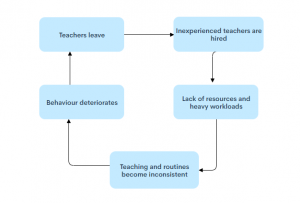
Possible Jobs After Teaching: Why I Chose Copywriting
An honest explanation of what drove me to quit teaching and work online.
Around a third of UK teachers leave within 5 years. I am one of them. And I haven’t looked back after finding one of the best alternative jobs for teachers: Content Writing.
Based on a union poll, the most common reasons for leaving a teaching job are:
- Unmanageable workloads
- Ofsted (England’s inspection office for standards in Education)
- The pressures of standardized testing
But it wasn’t just that. Behaviour can be a daily battle and schools are embarrassingly under funded. To the point where I’ve been forced to buy my own glue sticks, just to get by. If you’ve ever worked in a school, you’ll know that glue sticks are like gold dust, and there’s never enough of them. Mostly due to pasting ‘evidence’ for Ofsted into children’s books.
Surely now, after a 4-month gap in children’s education, it’s more important than ever to keep teachers in the classroom. The Department for Education know teachers are leaving and they know why. Even after publishing their 2019 ‘Teacher Recruitment and Retention’ Strategy, they are continuing to miss vital points, that are driving teachers away.
Why Standardized Testing Made me Question my Teaching Job and Purpose
The government’s retention scheme promises not to make any more changes to standardized testing in the coming years. This doesn’t really address the issue that standardized testing fundamentally doesn’t work.
“If you judge a fish by its ability to climb a tree, it will live its whole life believing that it is stupid.”
Every school knows how true this quote is and it rings true when you think about how testing in the UK works.
 I once sat next to a Year 2 child attempting to complete a SATS paper, who could barely write her name, let alone correct punctuation in a sentence. But she was forced to sit through it. We had to put her name on a test paper. If you gave that child an art project or a drama performance, she’d have passed with flying colours. Setting up a child to fail isn’t fair on them and it’s denying them opportunities where they could shine.
I once sat next to a Year 2 child attempting to complete a SATS paper, who could barely write her name, let alone correct punctuation in a sentence. But she was forced to sit through it. We had to put her name on a test paper. If you gave that child an art project or a drama performance, she’d have passed with flying colours. Setting up a child to fail isn’t fair on them and it’s denying them opportunities where they could shine.
So much pressure is put on teachers for their pupils to reach certain targets.
I’ll admit that I was once driven to add full stops to a child’s piece of work, just so I could tick a box and get them over a certain threshold. It’s utter madness, and I can’t be the only one. The frustration and pressure filter down and it’s impossible for the children not to feel it too. It seems that schools are not trusted enough to assess children on their own.
Teachers would have no reason to bluff about their pupil’s ability if you remove the pressures of data-driven testing. In my new role as a copywriter, I feel completely in charge of my workload and expectations. I can work from home or wherever I fancy and I’m my own boss, choosing the projects, hours and schedules I want to work by.
Why I Prefer to Rank on Google rather than Ranking in Ofsted Ratings
I’ve yet to meet a teacher who thinks Ofsted is helpful.
If I had a pound for every time I was told ‘You need to do this in case Ofsted come’, I’d be a very rich woman. What I found so difficult to comprehend was how much more I heard this than ‘You need to do this to benefit the children.’
 The weight that schools put on Ofsted’s opinions these days is crushing. I understand that the role of Ofsted is to ensure that standards are up to scratch, but does it do more harm than good?
The weight that schools put on Ofsted’s opinions these days is crushing. I understand that the role of Ofsted is to ensure that standards are up to scratch, but does it do more harm than good?
So many Head Teachers seem to put their entire life’s worth at the mercy of it, rather than the happiness of their children and staff. It creates a culture in schools where teachers are given masses of extra work, to ensure sufficient ‘evidence’ is created to show Ofsted. This means constant marking, assessments, paperwork, and laborious tasks.
Despite the disapproval of so many teachers, there is still an unhealthy culture in schools to be ranked the best.
When a school is audited (usually every 4 years or so), there are 4 possible grades it can receive:
- Outstanding
- Good
- Requires Improvement
- Inadequate
It seems that the goal of every Head Teacher is always the same: We must be outstanding.
In every school I’ve worked in, there were endless meetings, training and schemes to make the school outstanding. A grade which requires an incredible amount of work and criteria to be met, a lot of which, from my experience, does not directly help children learn.
Every teacher wants to improve and deliver the best lessons they can, but not achieving ‘outstanding’ can leave teachers feeling like they’ve failed.
Personally, I would much rather have a school full of happy teachers who put children’s needs first, than an ‘outstanding’ school that pushed teachers to the brink of insanity to gain its title.
The Department of Education has at least recognised this to some extent. They’ve promised new Ofsted frameworks will ‘consider whether teacher workload is unnecessarily high’ and ‘not look at any internal assessment data.’
When I now write articles, I apply SEO-friendly content writing techniques as taught in the SeekaHost University SEO copywriting course to rank my pieces in top positions on search engines. And guess what? I’m not stressed out, I don’t feel pressured, because analysing my content using SEO tools is fun and interesting and I can test different strategies. If one doesn’t work, I change it, adapt it and observe it.
Teaching VS Sanity
What really pushed me over the edge was the lack of support I received as a teacher. I begged management to provide additional support for children with special and behavioural needs but was told there wasn’t enough budget. In the end, I became the strictest teacher I could, with a zero-tolerance policy on everything, because I didn’t know what else to do. It was utterly exhausting. I felt as if the kids hated me and I’m sure some of them did, and I hated being that person. It wasn’t good for them and I couldn’t take it anymore. So, at the end of the year, I quit.
I started thinking about why I left and how it was all related.
When teachers leave at such a rate in the first few years of their career, it’s impossible to achieve any kind of consistency and children become unsettled, resulting in difficult behaviour.
I believe many schools are stuck in a cycle that’s all related to teacher retention and a lack of resources (see graph).
Of course, there are masses of other factors influencing children’s behaviour that teachers can’t control, but it really got me thinking that this theory does make sense. If you’re a teacher (or have your own kids), you’ll know that usually when you’re feeling happy, calm and stress-free, your kids will mirror that.
I now lead a much less stressful life as a copywriter, working on my own terms. I am flexible with how I organise my day, my work and my personal life. This has made me realise how much job satisfaction influences our quality of life.
So, how do we break the cycle of teacher frustration and exodus?
We can’t risk the children’s and teacher’s mental health by sticking it out. If this pandemic has taught us anything, it’s how important teachers and technology are to society. The government has to start putting more trust in teachers, investing more in school equipment, EdTech, and resources, and releasing the pressures put upon them, so they can get on with what they love doing the most: teaching children.
Only then, will those much-needed teachers, perhaps myself included, start teaching or tutoring again online or even in the classroom if delivery is fully supported, which is where technology can hugely help.
How I Started My Career As a Copywriter After Quitting Teaching
I’ve always wanted to be a writer. But somehow, after studying English and Creative Writing at University, I chickened out. Everyone around me was going onto grad schemes and getting ‘proper’ jobs, so I did that too.
 When I knew I was going to leave teaching, I applied for endless junior copywriter jobs, but unsurprisingly, no-one wanted to hire me with no experience. At that point, it didn’t even occur to me to start my own business. So, my route into copywriting has been slightly less direct.
When I knew I was going to leave teaching, I applied for endless junior copywriter jobs, but unsurprisingly, no-one wanted to hire me with no experience. At that point, it didn’t even occur to me to start my own business. So, my route into copywriting has been slightly less direct.
I’ve always been interested in TV (in my most chaotic moments of teaching, I’d often think, this is horrible, but wouldn’t it make great TV?).
I started off driving a massive van of equipment around central London, eventually making my way up to a freelance Assistant Producer, working on series for the BBC, Channel 4 and Apple TV. I enjoyed it, but I still wanted to write.
In my spare time, I set up an Upwork profile, wrote some example articles, and started writing web content for home pages for a few small businesses. I loved it and knew this was what I wanted to do, but I was making no-where near enough to live off it. So, I spent the next 2 years doing digital copywriting as a side hustle whilst freelancing in TV.
I kept applying for copywriting roles, but even junior roles with terrible pay would reject me. Then I had a brain wave. Why do I need to convince an agency to hire me when I’m already getting my own clients through Upwork?
If I did it properly, I could create my own copywriting business and start my own blog.
So ‘www.bespokecopywriter.com’ was born and I had absolutely no idea how to market it online.
After researching online how to do digital marketing, I found useful resources like Peter Kent’s “SEO for Dummies”, Neil Patel’s tips and some of the digital marketing courses and guides at SeekaHost University. Inspired by these I started:
- Writing articles and sending them to guest blogging sites.
- Spending hours analysing keywords and re-writing my website.
It’s taken a lot of hard work to get to where I am, and I’ve still got a way to go, but I’m getting there.
Sometimes I think how much easier it would have been if I’d started my copywriting business straight after University and how much further I would be with it.
I don’t regret my decisions, because having multiples careers has not only given me experience but actually made me a better writer.
I can therefore only encourage everyone who is unhappy in their current job to do what they love and follow their dreams. There are endless job opportunities online and the future looks very promising for any digital ventures.
You can find out more through these guides, which may inspire you to take on your online journey as I did:
Best Online Businesses To Start Guide

Ellen Parker now runs her own business, Bespoke Copywriter, where she specialises in writing website content and blogs, for businesses all over the world after she left teaching.
Author Profile
- Blogger and Educator by Passion | Senior Online Media & PR Strategist at ClickDo Ltd. & SeekaHost Ltd. | Fascinated to Write, Blog and Teach, I have completed a journalism summer course at the London School of Journalism and manage various WordPress blogs.
Latest entries
 Digital EconomySeptember 20, 2023A Guide to Digital Economics and the Rise of Digital Entrepreneurship
Digital EconomySeptember 20, 2023A Guide to Digital Economics and the Rise of Digital Entrepreneurship CareerJanuary 28, 2023How to Become a Digital Nomad? – (The Ultimate Go To Guide)
CareerJanuary 28, 2023How to Become a Digital Nomad? – (The Ultimate Go To Guide) BloggingJuly 23, 202110 Best Apps for Screen Recording to enhance your Blog & Social Media Content
BloggingJuly 23, 202110 Best Apps for Screen Recording to enhance your Blog & Social Media Content CareerMay 12, 2021Get a Private Blog Network Specialist Certification to build monetizable Online Properties professionally
CareerMay 12, 2021Get a Private Blog Network Specialist Certification to build monetizable Online Properties professionally
